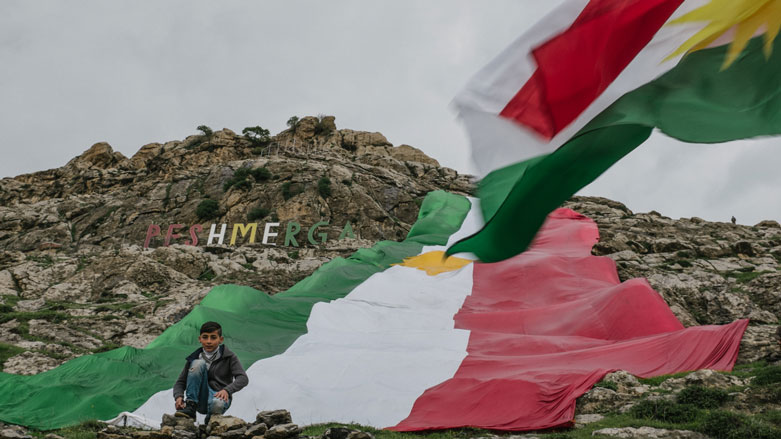Two Firsts for Kurdish Diplomacy

WASHINGTON DC, United States (Kurdistan24) – Dr. Fuad Hussein, Chief of Staff to Masoud Barzani, President of the Kurdistan Region, has spent the past week in Washington as part of an official Iraqi delegation. As the Iraqis returned to Baghdad, Hussein remains in the US for another week of meetings and discussions.
Hussein’s visit marks two important firsts. It was the first time the KRG participated in a conference of the US-led coalition against the Islamic State (IS.) It was also the first time a senior official of the Kurdistan Regional Government (KRG) met with the newly elected US president. Moreover, these firsts are taking place against a background of unprecedented US sympathy for Kurdish aspirations.
Fuad Hussein explained the significance of his presence at the coalition meeting, “This was the first time a KRG delegation took part in this conference,” he said. “The previous three conferences did not have us. We tried with the US and Iraq, and the Iraqis gave different excuses. But this time we were invited.”
Indeed, in an address opening the conference, US Secretary of State Rex Tillerson welcomed Barzani’s aide, telling the assembled foreign ministers and other senior government officials, ”I am pleased to see a representative from Kurdistan Regional Government, Mr. Fuad Hussein.”
The advantage for the Kurdistan Region in attending the conference is clear: a senior official can explain the KRG’s understandings and perspectives, as well as detail the needs of the Kurdistan Region. But the coalition also benefited. As one informed source told Kurdistan24, the Iraqis were unable to answer some questions that the other officials had, but Hussein could authoritatively address those issues.
As a member of the Iraqi delegation, Hussein also met with Donald Trump. On the campaign trail, Trump spoke expansively about the Peshmerga.
“They’ve proven to be the best fighters. They’ve really proven to be the most loyal to us,” Trump said. “They have great heart. They’re great fighters, and we should be working with them much more so than we are.” Presumably, he expressed similar sentiments in his first meeting with a senior Kurdish official as President Trump.
There now exists substantial friendliness between the US and the KRG, making Hussein’s meetings more significant.
In a casual encounter recently with former Vice-President Joe Biden, this reporter asked him why the Obama administration had not done more to support the Kurds. Biden responded by agreeing.
“Barzani is a good friend of mine,” Biden said, “and I think we should have done more to help the Kurds.”
Last month, at the Munich Security Conference, Barzani spoke with several senior US officials. In all of the meetings, Barzani stated self-determination is a Kurdish right, and none of his interlocutors had any objection.
Barzani’s meeting with Vice-President Mike Pence was brief, but that with Secretary of Defense James Mattis was particularly warm, according to a knowledgeable source.
Senator John McCain, Chairman of the Senate Armed Services Committee, led a 16-member bipartisan Congressional delegation to Munich, and the delegation met with Barzani. McCain, along with his close associate on the Armed Services Committee, fellow Republican Senator Lindsey Graham—in front of the entire Congressional delegation—urged the Kurdistan Region president, “Declare, Declare!” Meaning, declare your independence.
The State Department, in contrast, is known as a steadfast defender of America’s long-standing “one-Iraq” policy, which supports the unity of Iraq and opposes Kurdish independence. But even the State Department position seems to be shifting slowly.
A senior State Department official recently told Kurdistan24 that Kurdish independence was “something for the Kurds and the Iraqi government to speak to.” This reporter pressed him on that point to ensure there had been no misunderstanding. “Yeah,” he casually replied, “We’ve said that before.”
One Washington observer suggested, however, that this was a relatively new policy, which had emerged over the past few months. I subsequently discussed this point with an official from the State Department’s Bureau of Near Eastern Affairs (NEA), known for its pro-Arab orientation.
This NEA official, who also spoke on condition of anonymity, seemed surprised to hear that his agency had no objection to an amicable separation between Baghdad and Erbil. “I’m not going to dispute [it], he responded. “But I’m also not going to confirm [it.]”
As I had twice asked the question, I wasn’t asking for confirmation. Rather what he seemed to reveal, above all, was that the Trump administration was drifting away from hoary old dogma and catching some US officials unawares.
Editing by Delovan Barwari
